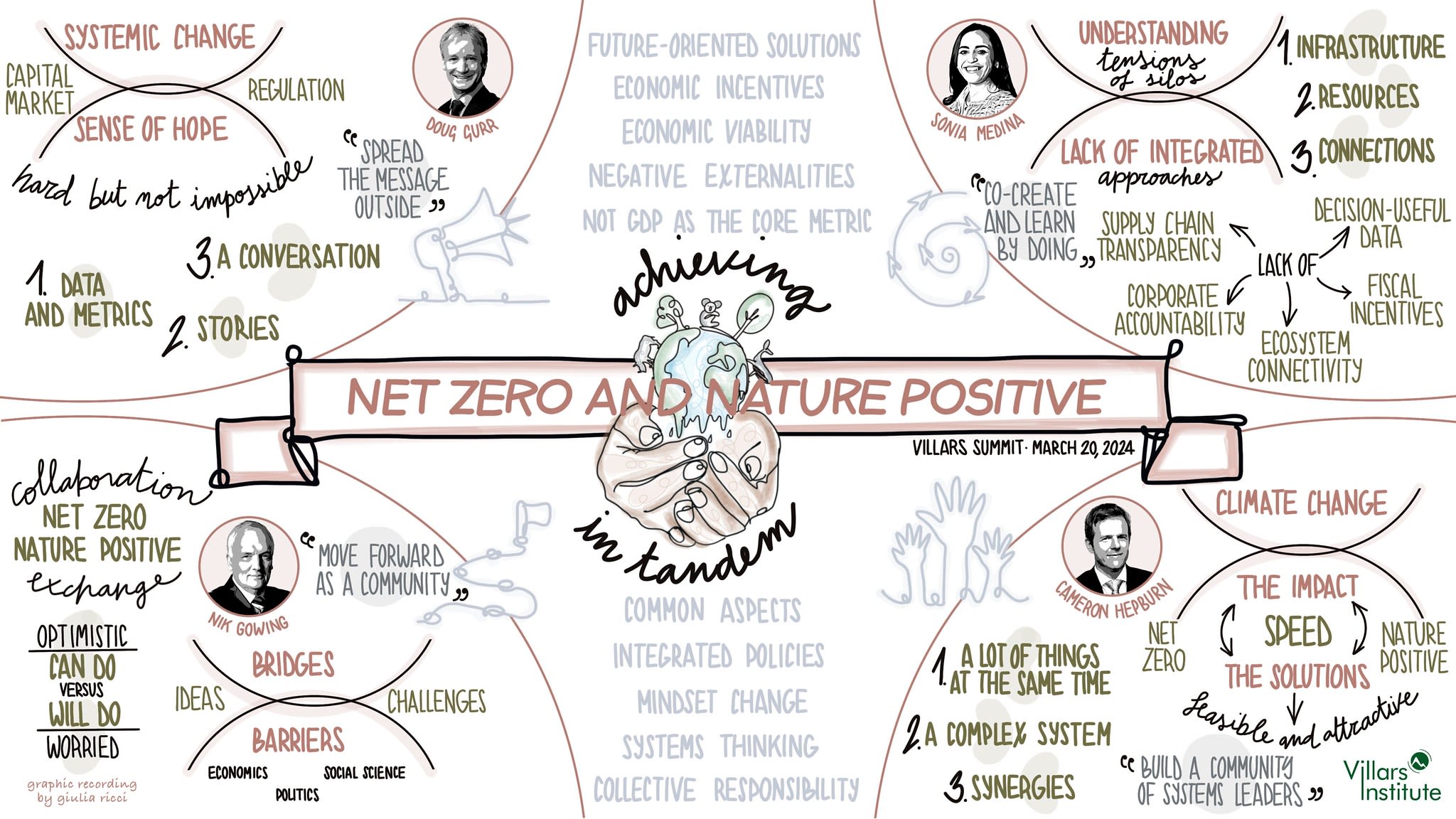The Ideas
To contextualise the forthcoming discourse, experts voiced concern for recent spikes in average temperatures, pointing towards the now inevitable transgression of the Paris 1.5°C limit, and described a 2-3°C scenario as “appallingly life-changing” – a catastrophe that could cost humanity $1200 trillion. For trends to be reversed, it was stressed that nature cannot be disregarded and emissions must no longer monopolise the existing narrative.
A key point among experts was the harmful fallacy in the existing economic model of not accounting for nature’s value or the positive growth associated with doing so. It was indicated that the market unhealthily ignores nature; this was partially attributed to a lack of fiscal incentives – a detriment tied to economic ministries which are convinced strong climate action fails to pass a cost-benefits analysis. Contrary to this belief, the experts held the conviction that tackling net zero and nature positive isn’t just feasible, but economically attractive when the stacking of dual benefits and falling prices in renewables are considered.
Furthermore, leveraging a Villars systems-thinking approach, experts illuminated the approaches to tackling this issue holistically. It was noted that a lack of integrated approaches, such as with the current siloing of funding or overlapping responsibilities, causes significant deficiencies in collaborative progress. Understanding silos and working to address them unlocks the synergistic potential for change. For example, funding could become a “connective tissue” to unite stakeholders. Additionally, a unified voice from the whole community providing specific recommendations, as well as the identification of moveable points (people, structures, etc.) in the complex system, is instrumental for success.
Positively, it was argued that technological advancement is currently moving at pace. Nevertheless, progress is continually impeded by a reversal in political advances and social cohesion, exacerbated by vested interests and falsities. Experts suggested that this could be solved by engendering hope and change through storytelling; thus, narratives can help force nature into the conversation.
Similarly, metrics as a solution emerged as a common theme. For those present, “decision-useful” data provided a basis of credibility in an ecosystem of doubt and disarray. The experts emphasised the critical importance of improving accountability standards and supply chain transparency through metrics to drive a corporate transition.
The Perspectives
Participants strongly echoed the sentiment of the experts in calling for a unified, integrated policy to address the lack of an interconnected response. For many, better synergies and organisation between the climate and biodiversity communities would help to eliminate negative trade-offs, and redundancies, and help solutions scale across sectors.
Several social barriers were also mentioned, such as existing geopolitical tensions and the dangerous power of the human ego. An interesting theory introduced by participants was the impact of ‘bystander apathy’ – how people typically feel less obliged to act when in a group, particularly due to a blur of responsibility between various stakeholders. This theory can be applied to our corporate environment, which struggles to be bold on net zero and nature positive.
In response, participants called for radical listening to and investing in voices from the ground through enhanced communication mechanisms between governments and corporations, and local communities.
Communication and metrics were also a priority. To bridge the gap in funding and understanding by quantifying natural capital, there was a call for new metrics to be created, and old ones like GDP – which represent a significant barrier – to be changed or reprioritized. Such metrics, as well as data collected on nature and carbon, should be collated as a common reference on the state of the world’s ecosystems. What is more, it was suggested that more needs to be done to factually illustrate the cost of doing nothing.
Much of the discussion revolved around the fundamental economic barriers. Reflecting on the words of the experts, participants decried companies' disregard for nature; they called for externalities (nature loss, carbon emissions) to be presented on an integrated balance sheet – describing them as being as integral as profits or losses – to properly appraise and incentivize action in the private sector.
Moreover, concerns around the conflict between nature positive and net zero were expressed: the two cannot be mutually exclusive. For example, monocultures cannot be used to capture carbon at the expense of natural systems, and lithium-ion batteries cannot be allowed to damage the environment while delivering ‘clean’ energy. One idea to combat this was to become more conscious when new technology is developed and use a systemic approach to appreciate the needs and interests of the agents in our systems.




